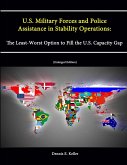Establishing an effective local police force is one of the most critical elements of successful counterinsurgency and stability operations, but is a task for which the U.S. government is poorly prepared and lacks capacity. This monograph retraces the recent history of U.S. foreign police training, from the well-coordinated effort by the U.S. Agency for International Development (USAID) from 1961 to 1974, the U.S. congressional prohibition of the use of foreign assistance funds for police training which ended the USAID police training role in 1974, and the subsequent evolution of a patchwork approach to U.S. foreign police training involving up to 30 departments and agencies, a variety of private police contractors, and multiple fund appropriations. Despite this bureaucratic complexity, the key principles for developing effective local police in stability operations remain the same. There must be a distinction between stability policing and community based policing, with a transition from the former to the latter at the appropriate phase of stability operations. Normative standards are critical for effective community based policing, and must be established by shaping police organizational subculture in the context of local societal culture. This monograph explores the way ahead to achieve these goals for effective local police in stability operations in the current complex and challenging operational environment.
Hinweis: Dieser Artikel kann nur an eine deutsche Lieferadresse ausgeliefert werden.
Hinweis: Dieser Artikel kann nur an eine deutsche Lieferadresse ausgeliefert werden.








